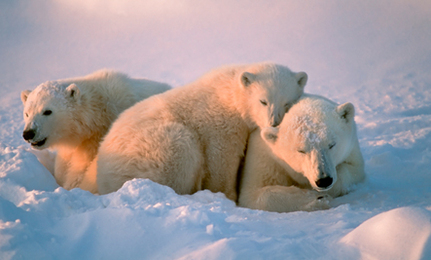Brown Bears and Polar Bears Met Often during Last 100,000 Years
A team of scientists discovered that the female ancestor to all modern polar bears was actually a species of brown bear living in Britain and Ireland just before the last ice age. The hybridization occurred between 20,000 and 50,000 years ago, and the species of brown bear has been extinct for the last 9,000 years.
According to the press release, “Beth Shapiro, the Shaffer Associate Professor of Biology at Penn State University and one of the team’s leaders, explained that climate changes affecting the North Atlantic ice sheet probably gave rise to periodic overlaps in bear habitats. These overlaps then led to hybridization, or interbreeding — an event that caused maternal DNA from brown bears to be introduced into polar bears.”
Researchers once thought that the female ancestor of polar bears lived about 14,000 years ago on the Alaskan islands of Admiralty, Baranof, and Chichagof. However, the new evidence collected from studying 242 brown bear and polar bear mitochondrial lineages (tracing genetic history from the mother’s side) from the last 120,000 years shows it happened tens of thousands of years earlier, and on a different part of the planet.
Hybridization Could Help Polar Bears Survive Environmental Changes
While polar bears and brown bears are strikingly different in their physical appearance, their ancestry seems to be intricately linked — and could be intermingled again as melting ice brings brown bears and polar bears back into contact with one another, creating hybrids of grizzlies and polar bears called “growler bears” or “pizzly bears.”
Apparently the hybridization we’ve witnessed recently due to global climate change and a reduction of sea ice has happened often over the last 100,000 years as warming and cooling cycles brought the bears in and out of contact with one another.
Shapiro states that a thorough understanding of the genetic history of polar bears as well as previous responses to environmental changes could conservationists form strategies for keeping polar bears from disappearing altogether.




